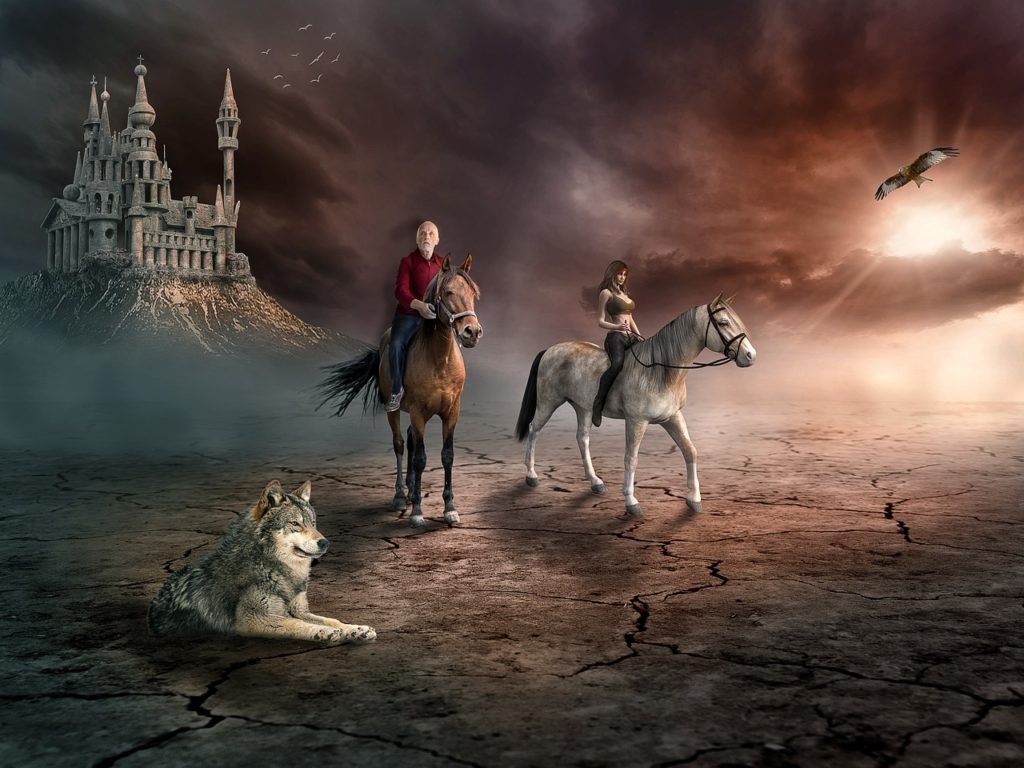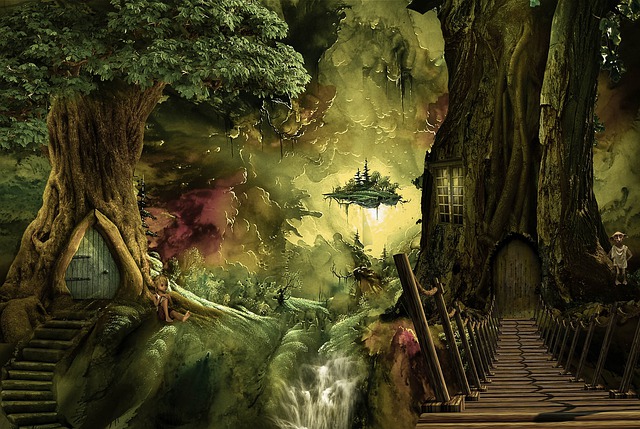Building a fantasy world that seems real to the readers should be the ultimate motive of the author. This article is all about fantasy world building. Authors must take the readers on a roller coaster ride by defining the fantasy in exactly the same way the authors felt about the adventure and drama while writing the story. Fantasy worlds are created in our minds every now and then while travelling or working on a computer/laptop or even playing outdoor games or video games.
Basically if you to want to write a fantasy book, use your power of imagination and willpower to live in your own imaginary world and that will give rise to a fictional world you are trying to create for your novel. Don’t just dream of wizards, elves, hobbits to write a fantasy story. If you dream of those, you cannot come up with your own inventive creatures. Readers want new stuff and that’s why you gotta believe in your creativity. Forget about the books you have already read and the movies you have already seen, your mind and imagination will create you the imaginary fantasy world which you not have seen or heard before. You can use the following methods as a guide/template to device your own fantasy world.
Draw a Map – Basic backbone of fantasy world building
Drawing a map gives you a vision to create your own fantasy world where you are going to put life to your landscape and characters. The map is not to be displayed for your readers. This is for own goal to define every elements require to build and design your fantasy world. Your map will show you the path where your characters, elements go throughout the novel. This is absolutely necessary when you are drafting an epic novel consisting of transformations in life, culture, land. You can also create a map to portray different landscape, hierarchical kingdom, relationships between the characters, objects and their supernatural abilities if they have any, wars, battles in course of your fantasy novel. Then you can use this map to draft your novel.
Start with place and time
The set up can be a fantastical world/futuristic world/post apocalyptic world. It is imperative for the reader to know whether the story is about past, present, future. Thus history of the place and time is important in drafting the fantasy world building.
- Does your world consists of different continents just like earth or built on a single landmass?
- Is your world set up in space in a distant galaxy?
Defining laws and rules for your fantasy world building
You might find this odd as this genre is fantasy, so why implementing rules? It’s like we can write fantasy what we feel without mentioning any rules. The world you create for e.g. fantasy or magical, you got to define rules just like a sci-fi story. The rules, protocols defined in your fictional/fantasy world should resonate and must be clear and comprehensible to the readers in every sense. Your fantasy world can be based on historic events of medieval age, byzantine civilization, age of renaissance, Mesopotamian, Harappan, Mohenjo-Daro, American folklore or some urban legends. You can also create a completely new abstract world out of your imagination. Whatever approach you are undertaking, it must be properly explained to the audience.
If your fantasy world is based on super advanced technology or an obsolete technology, a holistic and detailed explanation of working principles of the technology is must for all your fantasy stories. Don’t write superficial explanation that gives confusion to the readers. Whether it’s a scientific or fantasy, explanation of terms and jargons and rules in your story should be properly defined.
- Legal laws- What are the laws and punishment for crimes?
- scientific- Laws of gravity exists- yes or no?
- What kind of government does your world have?
- Who has power and who hasn’t?
- What do people belief here?
- Is there any social fabric?
- Do the inhabitants go to school/college/university?
- What do they look like?
- What do they have for breakfast?
- Do they believe in relationships and how they treat their elders?
- Do the people of your fantasy world age with time just like humans or do they look young forever? Are they immortal?
- What is the duration of day on your world?
- Does your planet have four seasons just like Earth?
Characters in Fantasy world building

Fantasy world is full of interesting and amazing characters. What is the species in your story? Are they humans, aliens, zombies, animals, beasts, demons, monsters, mutants?
- How do they communicate?
- Does the animals communicate to the humans.
- How they get along?
- Food habits of the inhabitants.
Lifestyle
You can ask yourself the following related to the lifestyle of your characters.
- Where do they stay?
- Do they stay in houses, mansions, tents, forest, desert, islands? Do they live in cities or villages?
- Does the animals communicate with the humans? How do they get along? Food habits of the inhabitants.
- Do they follow the lifestyle of conventional humans viz having breakfast, going to work and sleeping at night.
- How your characters feel about the society and the world they reside? Do they have common beliefs?
- What do they wear? What are their moral values?
- The values or morale will define and motivate your characters.
- Is their world defined by loyalty, honour, freedom.
- Is wealth most valued asset in the defining world?
- What is wealth defined in your fantasy world?
Of course, you can create characters whose values differ significantly from that of their world, but that difference is likely to be a source of conflict among characters in your novel.
Language
Novice authors often try to emulate J.R.R Tolkien’s art of defining the language of legends, orcs, elves, hobbits and of course fairy tales in their high fantasy story but often fail miserably. Setting the language and tone of your characters in the fictional world is important but using cryptic language may act as a turn off for the readers. Thus if you want to define the language or tone, define it properly and it must stay consistent throughout your novel. Defining or creating a new language for your specific characters or group of species is tough. No doubt, it adds flavour in your writing.
But make sure, the language should be defined properly to the readers even if you are using cryptic annotations or symbols for the ways of communication between the characters, animals or any species you are defining in your novel. Now setting up the tone of the characters is equally important. You have to maintain integrity of the tone of your protagonist, side kicks ,antagonists and other characters, species in your novel. Tone can be of any genres- loyal, friendly, mystical, sober or evil. It all depends which of your characters bear those tones and you must stay consistent. It doesn’t mean the protagonist may only bear a likeable tone, he/she can also bear an evil or notorious tone that may give chills. The crux here is whatever you define should be coherent and consistent throughout your novel.
Thrill in fantasy world building
The readers must feel and experience the fantasy world in the same way they experience in the real world by the senses of touch, taste, noise, music. Your world must be believable and deserves attention in the back story arc and motivation. Creating in depth sketch viz laws of the government, everyday life of the citizens,their relationships, dealing with the animals and other species. Adding these small stuffs hooks the reader in your story.
Mode of Transportation
What mode of transporation exists in your fantasy world?
Are these modes available? Flying cars, carriage, roller skaters, elephants, horses or any kind of custom rides.
You can create all of these by your imagination and come up with many other transportation rides and new concepts.
World’s history
Is there any history that shaped the fantasy world you’re building? The readers should have full knowledge on the history before you introduce them your characters. Any fights/wars happened between the clan or tribes? Does your character belong to the clans fighting among themselves?

Define Magic
Every fantasy world is defined by magic and fantasy stuff without which your fantasy novel is incomplete. In fact, magical power is the first thing that comes to the minds of a fantasy readers. Thus elements of magic are almost indispensable requirements for your fantasy novel. But magic can’t be anything. You must define magic clearly to the audience. Before defining magic in your story, you must ask the following questions to yourself as an author if you want to incorporate elements of magic in your novel.
1) How different is your fantasy novel magic from the real world magic?
2) Is the magic inherited/ acquired?
3) If acquired, what is the source of magic?
4) What are the limitations as well as the power of the magic?
5) What is the longevity of the magic?
Culture
These questions you must ask yourself if you want to incorporate presence of culture in your story. We all know cultures differ from place to place, even same place might have different cultures in the historical progress. People living in cities have different cultures to those living in villages. People living in mountains have completely different lifestyles to those living in valleys, plateau.
Your fantasy novel might contain these different cultures and the tribes and people coming from them might travel to distant land. Tolkien, a master in drafting these geographical cultural differences that crossed over 1000 years in middle earth history to modern age. There can be conflict with the different cultural tribes. The characters might need to travel to different land and get accustomed with new culture. There may be rift between the kingdoms of different cultures and there are so many options with which you can build your fantasy world based on the cultural differnces.
Conclusion
There is no mandate to use all the above mentioned points in your fantasy world building strategy. As an author, you are entitled to create the fantasy world your own way. The above rules are just to give a roadmap in building your story. You absolutely don’t need to put every elements to define your world. Fantasy world building can also be done in a simple way if your mind is brainstorming multiple complex ideas.
For example if your story is a post apocalyptic, there is nothing so much to describe the world although you can describe with few elements to define the post apocalyptic world.





I recently filled up a decent portion of a binder building a world I have been writing in for some time. While I have notes on deities and places, I have neglected the visual aspect of it and must draw a map soon!
I cannot tell you that how much I love this post! I read all of it and even bookmarked it for future use because as a writer I cannot tell you how useful this is. Thank you so much for writing this! 😍
I often get stuck in world building, but these are awesome guide questions to ask. Thanks for sharing this!
This is such an amazingly helpful post! Thank you for sharing this with us. Will definitely be using this in the future!
Great tips! Thank you for sharing! This would be a fun thing to do.
Wow….. thank you for sharing this guide. Now I can try to write fantasy stories.
Thank you so much for sharing this guide! I’d really like to write my own fantasy book one day and although I have ideas, I’m not always sure how to do the world building to help flesh out the characters and plot line. These are really helpful tips and I’ll be referring back to these in future!
Writing a fantasy book is a huge dream of mine.
I’ve recently started working towards it. I started off with a map and some basic laws.
I’m glad to see that I’m on the right track. Just have to get more in depth now.
Great post! I’ll save this to reference in the future.
Glad to know you find this guide helpful. Thank you for stopping by.